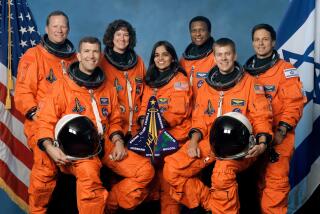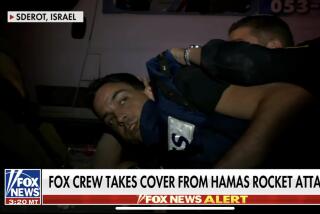When crises make TV all too real
- Share via
Broadcast networks may pride themselves on their ability to cover news, but few things cause more agita for executives than when actual events refuse to stay within the confines of the early evening half hour or the prime-time magazines. Too bad, because, as anyone who watches much TV knows, news has a way of disrupting plans -- and of stepping on shows that count as entertainment in calmer times.
So as the major broadcasters gear up for war in the next month or so, still coping with the aftermath of the Columbia space shuttle disaster, they are preparing on two fronts. The news divisions’ role is only the more visible part of the drill, as key anchors and correspondents move into position to get a handle on developments while grappling with the treacherous unpredictability of live television.
What viewers don’t see is the action in the other “war rooms” run by ABC, CBS, NBC and Fox. The generals here are the senior executives of the networks’ entertainment divisions, who engage in their own frenzied ritual behind closed doors as the news evolves. As they did following the Sept. 11 attacks and other national catastrophes, top honchos have to make quick and potentially costly decisions.
With prime-time schedules, cell phones and Blackberry wireless messaging devices at their fingertips, top executives on the East and West Coasts scramble to scrutinize their prime-time schedules for the weeks following a crisis to ensure that scheduled movies, comedies and dramas are appropriate in tone. Promos and scheduled commercials are reexamined as well. The discussions include heads of programming, sales departments, standards and practices and other top officials.
The shuttle tragedy on Feb. 1 illustrated the intricacies of these behind-the-scenes machinations. Heavily promoted episodes of fictional dramas were yanked; movies and specials were sidelined. “NTSB: The Crash of Flight 323,” an ABC movie dramatizing the work of the National Transportation Safety Board -- already delayed after the Sept. 11 attacks -- was pulled from its scheduled airing on the Thursday following the shuttle disaster. CBS temporarily shelved promos for its premiere of “Survivor,” one of the network’s most potent weapons in the February rating sweeps, a key period that networks use to determine advertising rates. Executives felt the word “survivor” might have a heightened sensitivity for viewers.
“The first thing we have to do when something like this happens is make a quick assessment of what programming we’re going to take out as we cover the news event,” said NBC network group President Randy Falco. “We have to look also at what we’re going to have on afterward. It’s never an easy call, and there are financial ramifications. But the bottom line is, we need to determine what’s right for the viewer, based on the level of the disaster and the impact on the nation. A tragedy like this had a real impact, not just in Texas, where it happened, but on the whole nation.”
Added Jeff Bader, executive vice president of ABC Entertainment, “We all take our cues when there’s a breaking story. Everyone knows their roles, and we step into them immediately.”
Even cable networks without news divisions had to make adjustments. FX pulled its scheduled 8 p.m. Saturday airing of “Armageddon.”
Executives at the four networks are preparing to launch into longer-range game plans as the possibility of war with Iraq grows. “All of us at CBS have been talking about the coming war for many months, and things are heating up,” said CBS President Leslie Moonves. “The producers of all our shows are aware of what themes and subject matters are off-limits. There has rarely been a case where they haven’t had the proper respect and taste to do the right thing.”
Added Bader: “It’s a complicated issue. Our division has been having meetings with the hard news department, keeping track of what’s going on. We will have to plan how many days we won’t have entertainment programming, whether we’ll have a prime-time news special each night. It will be a major exercise for all the networks.”
The networks’ handling of the shuttle disaster gave a taste of what may be in store, at least in a war’s early stages.
NBC’s Falco, who is the network’s No. 2 executive behind NBC Chairman and Chief Executive Bob Wright, went into action as soon as he learned about the shuttle disaster while watching “The Today Show” about 9:30 a.m. Saturday as he sipped morning coffee at his home in New York’s Westchester County. He contacted Neal Shapiro, head of NBC News, and Jeff Zucker, the network’s entertainment president. Shapiro was at his home in Connecticut, while Zucker was in Los Angeles.
“Those are the two major decision makers who I get on with when something like this happens,” said Falco. “There’s an urgency about it, but it comes easy for us because we’ve worked together for so long.”
During the day, Falco consulted “many, many times” with Shapiro and Zucker, as well as Ken Schanzer, president of NBC Sports, and John DeWald, the head of network operations. Their discussions led to the expansion of live news coverage through most of the day, the preemption of an afternoon news special and the production of a commercial-free edition of the “NBC Nightly News” and a prime-time news special on the shuttle.
Falco and Zucker also agreed that an episode of its unscripted reality series “Meet My Folks,” with its lighthearted tone, was inappropriate to air that night. “Jeff and I were e-mailing each other, and we both said this is not the right thing to have on.” The episode, which will be broadcast at an undetermined later date, was replaced by a prime-time news special hosted by main anchor Tom Brokaw.
The network sales department also was in touch with advertising agencies to determine whether any commercials that would air when regular programming resumed would be inappropriate. “The agencies are very sensitive to that, and we didn’t discover any problems,” said Falco.
While Falco was overseeing the network on the East Coast, Preston Beckman, Fox’s executive vice president of strategic program planning, was making decisions from his Los Angeles home. As soon as he heard about the shuttle explosion after listening to the radio early Saturday, he thought almost immediately about an upcoming episode of a Fox series.
“The first thing that hit was realizing that we had an episode of ‘John Doe’ airing the following Friday that was now problematic,” said Beckman. The episode involved an astronaut who was killed in a non-space-related incident.
“I knew there was this eerie connection,” he said. He e-mailed Fox Television Entertainment Group President Sandy Grushow and Fox Entertainment President Gail Berman, and they all agreed that the episode, which had already been heavily promoted, should be pulled and aired later.
ABC executives went into their own strategy, going over the schedule and consulting with ABC President Alex Wallau. Bader notified ABC Entertainment Television Group Chairman Lloyd Braun and ABC Entertainment President Susan Lyne of the explosion. He realized almost immediately, he said, that the NTSB movie would have to be pulled.
He also had concerns about promos for two dramas, “Veritas: The Quest” and “Miracles,” both of which involved plane mishaps: “We wanted to make sure that the promos didn’t make it seem like there were plane crashes in the episodes.”
Moonves was on the phone with CBS News President Andrew Heyward through the day Saturday. “There were many decisions. We had a basketball game scheduled, which we preempted. We had a golf tournament later in the day, which we delayed for an hour. I was also talking with current programming and scheduling and programming folks to determine what we might have to preempt.
“When faced with situations like this, there are constant choices that have to be made,” Moonves concluded. “But the obvious priority is that we do the right thing for the public good.”
More to Read
The biggest entertainment stories
Get our big stories about Hollywood, film, television, music, arts, culture and more right in your inbox as soon as they publish.
You may occasionally receive promotional content from the Los Angeles Times.











